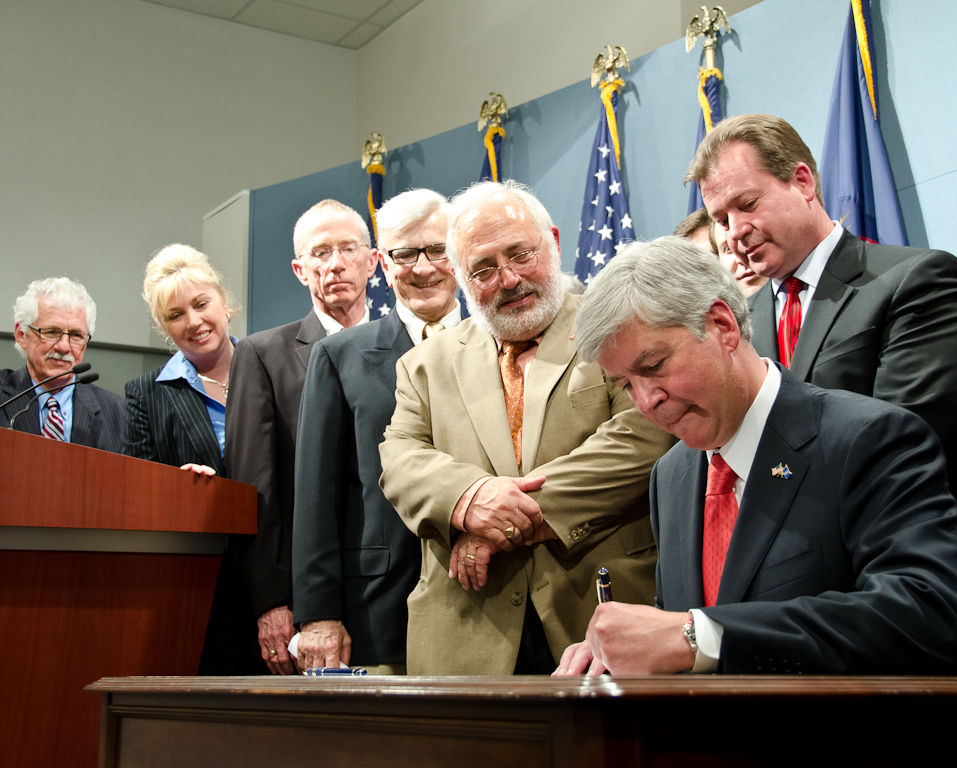Michigan is now moving forward with the expansion of Medicaid under President Obama’s health care law, after a 75-32 September 3 vote in the Michigan House which followed a 20-18 August 27 vote in the Michigan Senate.
At the urging of Republican Gov. Rick Snyder, Michigan’s legislature passed what Snyder and others refer to as “Healthy Michigan” with the votes of 28 House Republicans and 8 Senate Republicans. House Democrats unanimously supported the proposal, and only one Senate Democrat voted against it.
Hospitals Backed Move
According to Mackinac Center Senior Legislative Analyst Jack McHugh, the expansion was pushed through in part because of support from the state’s hospital systems.
“This vote was the product of a market-like ‘fear vs. greed’ calculation by Republicans, who comprise the majority House and Senate caucuses here,” McHugh replied. “They fear the wrath of their ‘base’ voters who scorn Obamacare, but they are also greedy for how much their local hospital cartels will love them for providing a massive new revenue stream.”
“Most of the expansion money will go to hospitals networks in the form of Medicaid managed care contracts,” McHugh explained.
“Given the well-known Obamacare animus of the GOP base, it’s remarkable that no one in the mainstream media has asked a seemingly obvious question: What do Republican legislators who expect to pay a heavy political price hope to gain by voting for the expansion?”
As in other states, Medicaid expansion in Michigan has been backed by health industry lobbying groups, labor unions, the AARP, and socialized medicine advocates including the Universal Health Care Action Network. With the exception of the Michigan Chamber of Commerce and Detroit Regional Chamber, Healthy Michigan Now lists the same supporting organizations as Expand Medicaid, a separate coalition of groups “seeking public policies that will provide health insurance to all and reduce health care costs.”
“Healthy Michigan is a plan that to provide health insurance coverage to half a million working Michiganders who are in or near poverty,” the Healthy Michigan Now campaign wrote of the expansion.
Misleading Arguments for Expansion
Asked to identify what he felt was the most misleading pro-expansion talking point used to pressure legislators, McHugh said Republicans used a three-part argument starting with claims the Medicaid expansion was about “reforming Medicaid.”
“The spin on this one got so deep some of these politicians were actually wrapping the expansion in the mantle of ‘Reagan conservatism,'” McHugh said.
McHugh explained Republican advocates of expansion insisted “even if it were related to Obamacare, getting some marginal changes in this unsustainable and poor-for-beneficiaries medical welfare program was worth the price of further entrenching a vulnerable federal health care law that practically every Republican legislator has said should be repealed.”
Finally, McHugh said, Republicans voting for the Medicaid expansion claimed Michigan “will rescind the expansion” if certain waiver requests included in the bill are not granted by the federal government by the end of 2015.
“This one is doubly dishonest: Legislators know full well the Obama administration will never approve a 48-month cap, because it goes against everything Obamacare is about,” McHugh explained. “They know even more that once those $3 billion in annual federal dollars start flowing through this state’s hospital system, a future legislature will never pull the plug.”
New Contracts Incoming
McHugh noted the Mackinac Center released multiple studies, held a series of events, and published numerous blog posts and news items countering the arguments for the PPACA Medicaid expansion as the legislature debated the issue—but the well-funded push for expansion was ultimately successful.
The next step for state officials, McHugh said, is “to start arranging those new Medicaid managed care contracts with the hospital networks, which will have some new mandates and hoops for the latter to negotiate.”
“We regard this hugely destructive and un-American federal law as highly vulnerable to being reopened as early as next year for some major course-corrections that mitigate the damage,” McHugh said. “Michigan legislators have made that preferred outcome less likely by propping up the law in an important state.”





